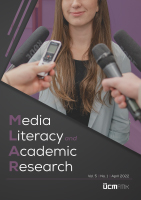Epistemic and Ethical Risks Of Media Reporting in the Context of the Covid-19 Pandemic, as Challenges for the Development Of Journalistic Practice
Epistemic and Ethical Risks Of Media Reporting in the Context of the Covid-19 Pandemic, as Challenges for the Development Of Journalistic Practice
Author(s): Sabína Gáliková Tolnaiová, Slavomír GálikSubject(s): Social Sciences, Education, Media studies, Epistemology, Ethics / Practical Philosophy, Health and medicine and law
Published by: Univerzita sv. Cyrila a Metoda v Trnave, Fakulta masmediálnej komunikácie
Keywords: COVID-19; Media Reporting; Journalistic Practice; Epistemic and Ethical Risks; Professional Development; Education; Knowledge Journalism;
Summary/Abstract: In this article, the authors intend to analyse risks related to media information in the context of the COVID-19 pandemic and identify demands in terms of the nature and development of journalistic practice in the post-covid time. The first part focuses on journalists in terms of their fitness for professional performance, revealing particularly their epistemic, or cognitive and ethical insufficiency that may be caused also by (conscious and unethical) inadequate preparation for the profession. Here, the authors notice a general professional crisis in journalism, particularly the long-standing imminent crisis of its (epistemic and ethical) normativity, greatly influenced by digital technology in journalistic practice. The authors take these phenomena as signals for further development of journalism as a socially valuable profession, particularly in the long- neglected science journalism. The second part of this article is dedicated to the outline of journalistic expertise in terms of knowledge-based journalism. They describe some basic prerequisites, namely the journalist’s ability to use knowledge in the process of their professional assessment and practice, and balanced journalistic competence that incorporates skills, expertise and ethos.Pursuing a better quality performance of journalism, they emphasize the need to accept the principle of a close link between epistemic and ethical professional excellence of journalists that includes epistemic and moral virtues. In the third part, they describe the development of journalistic expertise and training – epistemic, or cognitive and moral development, as well as the development of journalistic (communication and media) skills, especially digital competence in the context of scientific evidence. Finally, in terms of academic (or professional) training, they emphasise a combination of reflexive practice and applied theory.
Journal: Media Literacy and Academic Research
- Issue Year: 5/2022
- Issue No: 1
- Page Range: 76-94
- Page Count: 19
- Language: English

